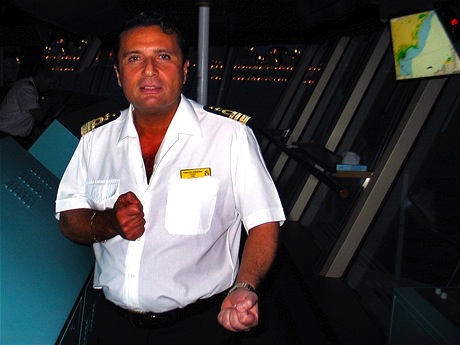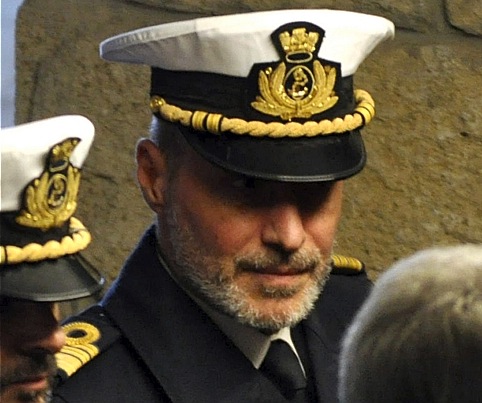In the novel Lord Jim, a rusty old ship carrying 800 Muslim pilgrims across the Indian Ocean to the Red Sea, to the promise of salvation, the reward of eternal life, collides with a ‘floating derelict” during a “silent black squall. Terror possesses the captain and several of his officers, who jump from the ship, wantonly abandoning the sleeping passengers. In the safety of their life-boat, dishonor trumps death. The disgraced captain is put on trial and degraded, exiled from his family.He has escaped with his dishonor without being able to forgive himself for his own mistakes. Recurringly Jim envisions himself as “always an example of devotion to duty and as unflinching as a hero in a book.”
All it takes is one look at the smarmy mug of Francesco Schettino to see he is no Captain Jim. His skin, à la Silvio Berlusconi gold, his sea-faring mullet, and his sea captain’s shirt unbuttoned to reveal a tuft of groomed chest hair, all personify the worst of Italy’s stereotypes – hell, the worst of modern man. Schettino’s reputation is that of a womanizing insubordinate, a gloating egomaniac. He is a risk taker in the worst sense of the word. According to a crew member, “He drives a ship like a Ferrari”. You know, he’s an idiot.
A local newspaper bemoaned the captain’s “superficiality, the carelessness, the pomposity, the abdication of responsibility.” Schettino’s failure of leadership is literally a cliché—that of a leader who abandons his ship.
“I tripped and I ended up in one of the boats. That’s how I found myself in the lifeboat”.
Gregorio Maria De Falco, the head of operations at the Port Authority in the Tuscan coastal city of Livorno, is a silver fox of almost Javert-like intensity to duty. He is the stalwart folk hero to Schettino’s greasy villain. Transcripts show how the laconic coastguard captain mocked the fleeing Schettino, urging him to fulfill his duty and return to the £400 million vessel, which came to grief after hitting rocks off a Tuscan island. The first conversation between the captains takes place only a few minutes after the 4000 passenger luxury liner hit an underwater reef. Even though it had suffered a fatal gash in its hull, Schettino lies to the concerned De Falco, telling him that everything is fine. In a series of increasingly desperate telephone exchanges, Schettino complains that he could not get back on the ship because it had capsized (!). De Falco then screams “Vada a bordo, cazzo!” (“Get back on board, for fuck’s sake!”). But with his terrified second-in-command sitting next to him, Schettino flatly refuses – complaining that it is ‘dark and he can’t see anything’
Schettino: “But do you realize it is dark and here we can’t see anything …”
De Falco: “And so what? You want to go home, Schettino? It is dark and you want to go home? Get on that prow of the boat using the pilot ladder and tell me what can be done, how many people there are and what their needs are. Now!”
Schettino goes so far as to ask the voice on the phone how many fatalities there are. In his boat, which he is standing beside. De Falco completely melts down.
De Falco: Listen Schettino, that you saved yourself from the sea, but I am going to … really do something bad to you … I am going to make you pay for this. Go on board, (expletive)!”
Schettino faces charges of multiple manslaughter, causing shipwreck and abandoning ship, and the devastating transcript of the shipwreck’s events which makes a mockery of his claims that he had ‘saved’ lives. He might, like Captain Jim, move from one place to the next in a futile attempt to escape the demons of shame and regret, forever haunted by the dishonor of breaking the oldest code of the sea – indeed, one of the oldest codes of the world. When disaster strikes, the skipper stays on board until the last person has reached safety. The captain goes down with the ship.
“And that’s the end. He passes away under a cloud, inscrutable at heart, forgotten, unforgiven, and excessively romantic. Not in the wildest days of his boyish visions could he have seen the alluring shape of such an extraordinary success! For it may very well be that in the short moment of his last proud and unflinching glance, he had beheld the face of that opportunity which, like an Eastern bride, had come veiled to his side.”



